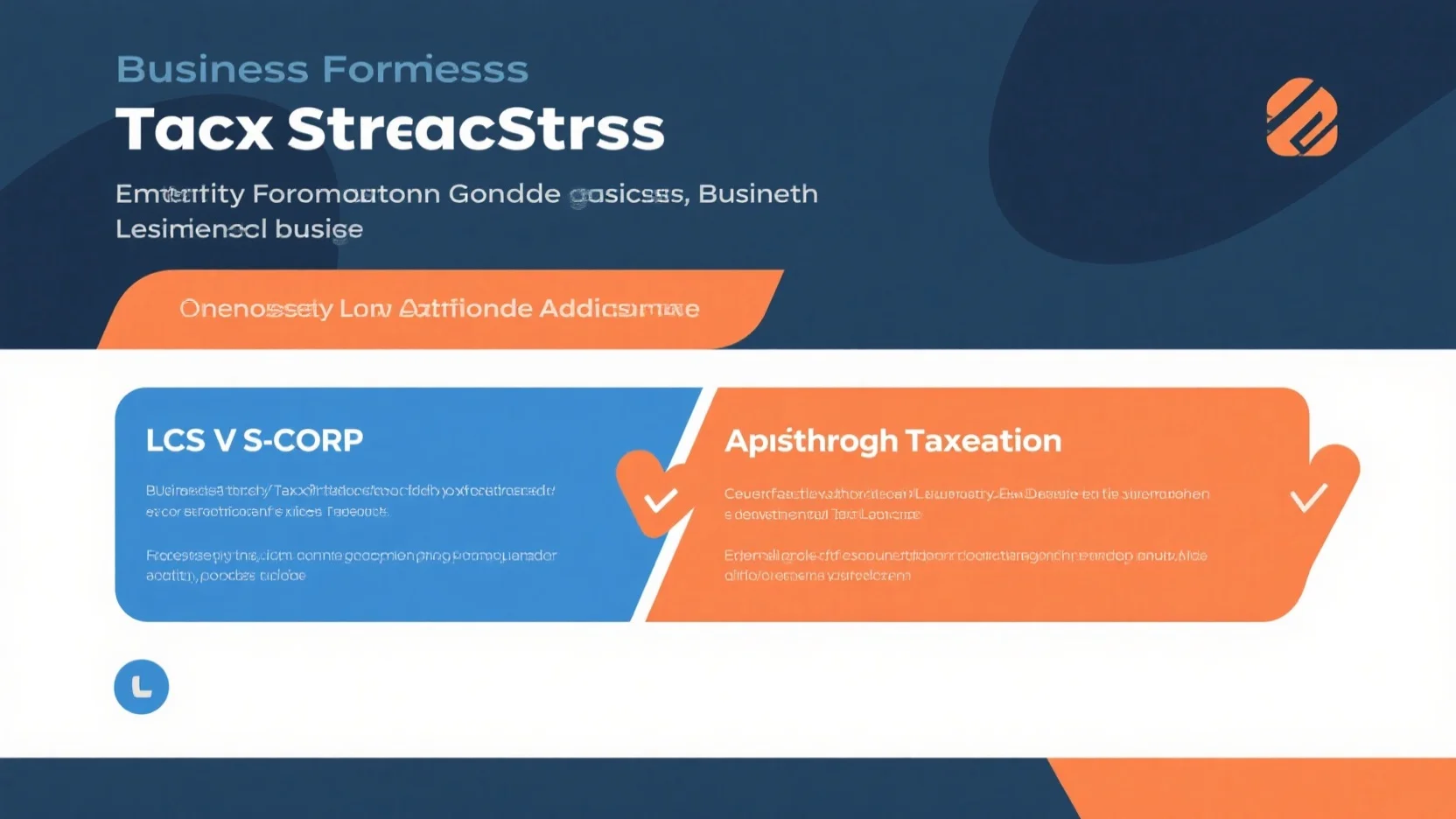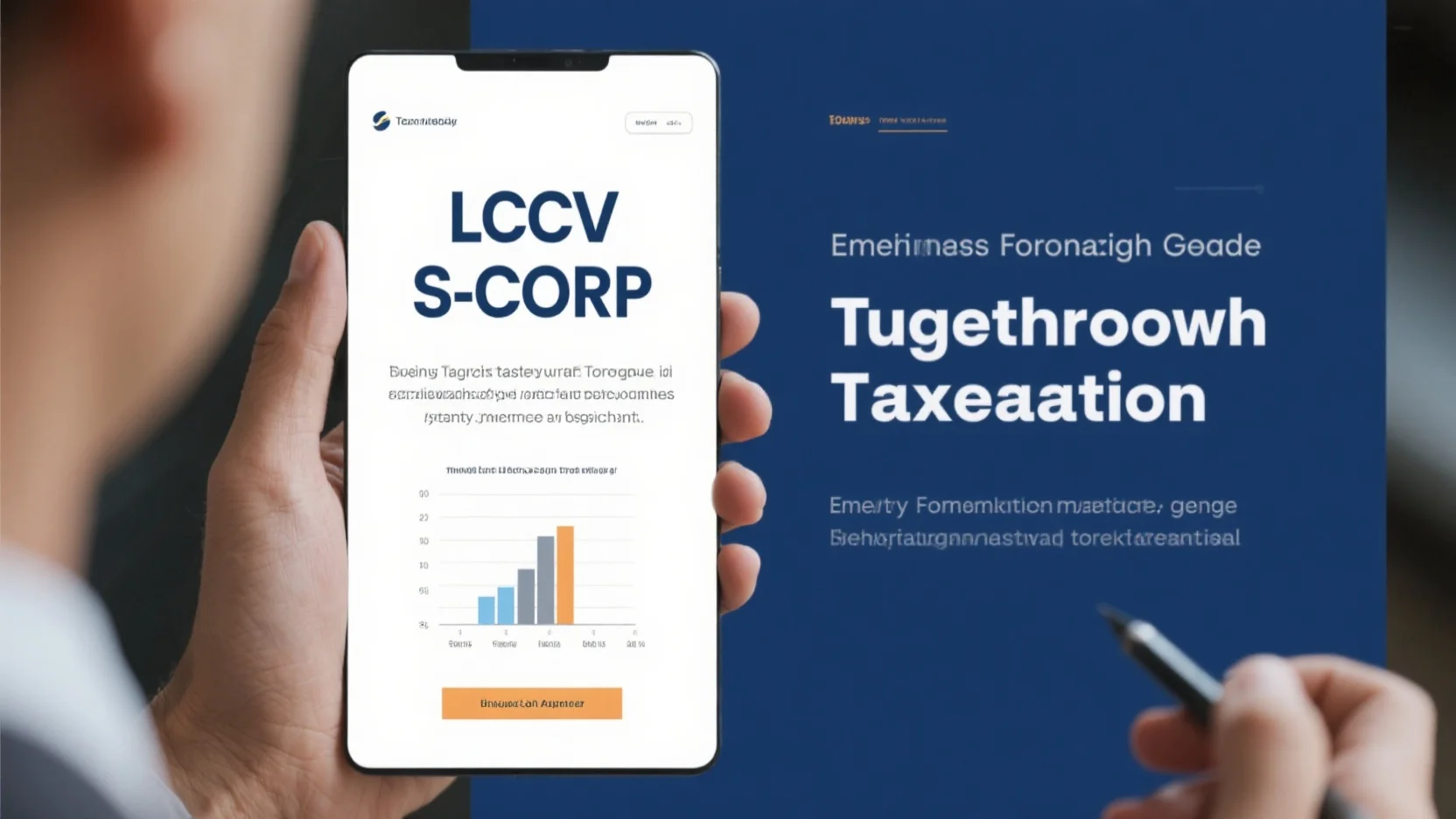Image Source: pexels
How much you save on taxes depends on income and rules. When considering LLC vs 2025 S-Corp: Which Business Structure Saves You More Taxes?, it’s important to note that LLCs use pass-through taxation, so profits are taxed once on members’ returns. S-Corps also pass through income but lower self-employment taxes. They only tax salaries, not distributions. By 2025, S-Corps can save more if set up correctly.
Tip: Check your income and profits to pick the best structure for saving taxes.
Taxation Comparison Table:
| Entity Type | Taxation Method | Self-Employment Tax Effects |
|---|---|---|
| LLC | Pass-through | All income taxed at 15.3% SE tax |
| S Corp | Pass-through | Only salary taxed; distributions are not taxed |
Key Takeaways
- Both LLCs and S-Corps use pass-through taxes. S-Corps save more by taxing only salaries, not payouts.
- Picking LLC or S-Corp depends on business size and income. LLCs are flexible, but S-Corps save taxes for big profits.
- Check state tax rules before choosing. They affect savings and duties.
Understanding LLCs and S-Corps
LLC Tax Structure
LLCs have simple tax rules. A single-owner LLC is taxed like a sole proprietorship. The owner adds profits to their personal tax return. They don’t file a separate business tax return. Multi-owner LLCs are treated like partnerships. Each owner reports their share of profits on their own tax return.
LLCs use pass-through taxation. This means the business doesn’t pay federal taxes. Instead, profits and losses go to the owners. But all earnings are subject to self-employment taxes. These include Social Security and Medicare taxes. This setup is easy for small business owners to manage.

S-Corp Tax Structure
S-Corps also use pass-through taxation but work differently. Owners report income on personal tax returns. Only salaries are taxed for self-employment. Extra profits, called distributions, skip these taxes.
To be an S-Corp, businesses must follow IRS rules. They can’t have more than 100 owners. All owners must be U.S. citizens or residents. S-Corps must also pay owners a fair salary. This salary is taxed for payroll purposes.
Key Tax Differences
LLCs and S-Corps have important tax differences:
- LLCs pay self-employment tax on all earnings. S-Corps only tax salaries.
- S-Corps let distributions avoid self-employment taxes, saving money.
- LLCs have fewer rules and are easier to manage.
- S-Corps must follow IRS rules, like limiting the number of owners.
When deciding between LLC and 2025 S-Corp, S-Corps often save more taxes for high-profit businesses. But LLCs are simpler for smaller businesses or those needing flexibility.
Taxation Differences
Self-Employment Taxes
Self-employment taxes pay for Social Security and Medicare. LLC owners must pay 15.3% on all earnings. This rule applies to both single-owner and multi-owner LLCs.
S-Corps handle these taxes differently. Owners only pay self-employment taxes on their salaries. Extra profits, called distributions, are not taxed this way. For example, if an S-Corp owner earns $80,000 as salary and $40,000 as distributions, only the $80,000 is taxed. This setup can save S-Corp owners a lot of money.
Pass-Through Taxation
Both LLCs and S-Corps use pass-through taxation. This means the business doesn’t pay federal income taxes. Instead, profits and losses go to the owners’ personal tax returns.
This system avoids double taxation. Double taxation happens when businesses and owners both pay taxes on profits. For S-Corps, only salaries are taxed for FICA, not distributions. This can lower taxes for businesses that earn a lot.
Reasonable Salary for S-Corps
The IRS says S-Corp owners must pay themselves a fair salary. This stops owners from skipping self-employment taxes by taking only distributions. A fair salary depends on the business’s money, the owner’s work, and wage data.
| Factor | What It Means |
|---|---|
| Business’s Money | How much money the business makes. |
| Owner’s Work | The tasks and duties the owner does. |
| Time Spent | Hours the owner works for the business. |
| Skills and Training | The owner’s experience and education. |
| Employee Pay | Salaries paid to other workers. |
| Wage Data | U.S. wage info from labor statistics. |
Following these rules helps S-Corp owners avoid IRS trouble and save on taxes.
Qualified Business Income (QBI) Deduction
QBI Deduction for LLCs
LLC owners can deduct up to 20% of business income. This is called the Qualified Business Income (QBI) deduction. It applies to pass-through businesses like LLCs. Owners can adjust profit distributions, which may increase their deduction. For example, if income is within a certain range, LLCs might give the same or better deductions than S-Corps. But if income goes above this range, SSTBs lose the QBI deduction. At that point, the type of business matters less.
QBI Deduction for S-Corps
S-Corps also get the QBI deduction, like LLCs. But they calculate it differently because owners must take a salary. This salary lowers the income used for the QBI deduction. Even so, S-Corps can get bigger deductions when salaries are included. This is especially true if income is within the phase-in range for SSTBs. Like LLCs, S-Corps lose the QBI deduction for SSTBs if income goes over the range.
Tax Savings from QBI
The QBI deduction helps lower taxes for LLCs and S-Corps. Single filers earning under $182,100 or joint filers under $364,200 in 2023 get the full deduction. Above these amounts, SSTBs lose the deduction. Non-SSTB businesses can still claim it, but the amount depends on wages and income. Comparing LLCs and S-Corps, high earners often save more with S-Corps. This is because S-Corps separate salaries from distributions.
Profit Sharing and Tax Filing
LLC Profit Sharing
LLCs let members decide how to split profits. They don’t have to follow ownership percentages. Members can share profits based on their work or agreements. Single-member LLCs report profits on personal tax returns. Multi-member LLCs follow partnership tax rules. Each member reports their share as agreed.
But all LLC profits face self-employment taxes. These include Social Security and Medicare taxes. This can make taxes higher for LLC owners, especially those earning a lot.
S-Corp Profit Sharing
S-Corps split profits differently. Shareholders must divide profits by ownership percentages. This keeps profit-sharing fair and equal. S-Corps also file IRS Form 1120S every year to report finances.
S-Corp owners must take a fair salary before getting profits. Salaries are taxed for payroll, but profits are not. This setup can save S-Corp owners more money than LLC members.
| Business Type | Profit Sharing Rules | Tax Filing Rules |
|---|---|---|
| LLC | Flexible, based on agreements | Depends on classification |
| S-Corp | Must match ownership percentages | File IRS Form 1120S yearly |
Tax Effects of Profit Sharing
Profit sharing affects taxes for LLCs and S-Corps differently. LLC members pay 15.3% self-employment tax on all profits. Single-member LLCs report profits on personal returns. Multi-member LLCs are taxed like partnerships.
S-Corp owners lower self-employment taxes by paying them only on salaries. Profits are not taxed this way, saving money. Careful planning helps S-Corp owners pay less tax than LLC members.
Tip: S-Corps save on taxes by reducing self-employment taxes. LLCs allow more freedom in splitting profits.
State-Level Tax Considerations
State Taxes for LLCs
LLC state taxes differ across the U.S. Some states add extra fees or taxes, raising costs.
- In Texas, LLCs pay a franchise tax if revenue is over $2.47 million in 2025. Smaller LLCs under this amount owe no tax but must file reports yearly.
- California charges LLCs at least $800 yearly if they are partnerships or disregarded entities. Extra fees, based on income, range from $900 to $11,790.
- Connecticut has a $250 business entity tax for LLCs.
- New Jersey charges LLCs with New Jersey income and more than two partners $150 per owner, up to $250,000.
These rules show why knowing state tax laws is important when picking a business type.
State Taxes for S-Corps
S-Corps also deal with special state tax rules. Most states accept federal S-Corp elections, but some need a state election too.
- Texas taxes S-Corps with revenue over $2.47 million, like LLCs. But Texas has no personal income tax, which helps S-Corps.
- Wyoming and Nevada don’t have corporate income taxes, which benefits S-Corps there.
- In Massachusetts and New York, S-Corps may pay state-level taxes instead of full pass-through treatment.
Franchise tax rates vary for LLCs and S-Corps, and S-Corps sometimes pay more.
Examples of State-Specific Rules
State tax rules can greatly affect LLCs and S-Corps.
| Tax Type | What It Means |
|---|---|
| Franchise taxes | Some states charge a flat fee or tax based on LLC income. |
| Annual fees | These differ by state, ranging from $50 to hundreds of dollars yearly. |
| Sales tax | LLCs selling goods or services may need to collect state sales taxes. |
- States like New York require S-Corps to file a separate state election.
- Some states tax S-Corps at the entity level, despite federal savings.
- LLC tax treatment varies; some are taxed like sole proprietorships, while others face entity taxes.
Knowing these rules helps decide between LLC vs 2025 S-Corp: Which Saves You More Taxes?
Choosing the Right Structure
When an LLC is Better
An LLC is great for small businesses needing flexibility. Owners can split profits and losses based on agreements, not ownership. This setup often helps with taxes for unique businesses. LLCs are also easier to manage with fewer rules and reports.
Starting an LLC is cheap, costing $0 to $150 in most states. Single-member LLCs are simple, while multi-member LLCs allow shared ownership. LLCs also protect assets without the hassle of corporate rules.
Note: LLCs work best for businesses wanting simple and flexible management.
When an S-Corp is Better
S-Corps save taxes for businesses making high profits. Unlike LLCs, S-Corps don’t tax distributions for self-employment. Owners only pay payroll taxes on fair salaries, lowering taxes overall.
S-Corps are good for businesses needing formal management. They fit companies with many shareholders or a clear structure. But S-Corps must follow IRS rules, like ownership limits and paying salaries.
Tip: S-Corps help businesses save taxes and stay organized.
Key Factors to Consider
Choosing between an LLC and an S-Corp depends on:
- Taxation: Think about self-employment and payroll taxes.
- Ownership Structure: LLCs are flexible; S-Corps share profits by ownership.
- Administrative Requirements: S-Corps have more rules than LLCs.
- Business Goals: Decide if simplicity or tax savings fit your plans.
Every business is different. Owners should think carefully and get advice before deciding.
S-Corps help save money by lowering self-employment taxes. Owners get salaries and extra profits as dividends, which skip self-employment taxes. LLCs are easier to manage and more flexible, great for small businesses. Your income, business size, and state taxes affect the decision. A tax expert can give advice, help save money, and ensure you follow rules. To choose between LLC and 2025 S-Corp, knowing these differences is very important.
FAQ
How does an S-Corp save more on taxes than an LLC?
S-Corps save on taxes by only taxing salaries. Distributions are not taxed. LLCs tax all profits as self-employment income.
Can an LLC become an S-Corp later?
Yes, an LLC can change to an S-Corp. File IRS Form 2553 to make this switch. This helps the business enjoy S-Corp tax benefits.
Do all states accept S-Corp status?
No, not all states treat S-Corps the same. Some add extra taxes or need separate elections. Check your state’s rules before deciding.
Tip: Talk to a tax expert to learn state rules and save more on taxes.





